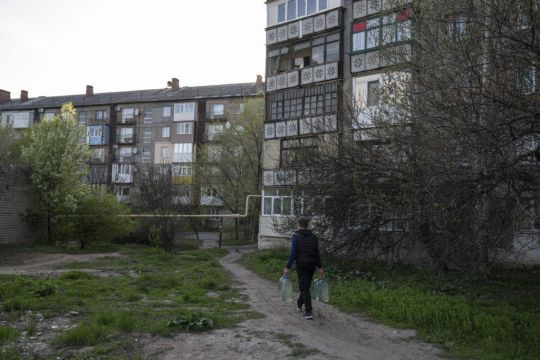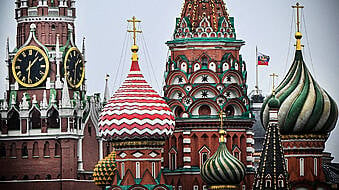War has again drawn near to Toretsk in eastern Ukraine.
Even the sudden crackling of a plastic water bottle puts residents on edge.
“Anything that is happening, any noise, if our neighbours bang the door, a metal door, you are shocked,” said resident Andriy Cheromushkin.
“You feel so helpless.”

Half of the more than 32,000 residents have fled.
Many who remain lack money and basic resources.
Depression is growing, along with anger.
“I collect rainwater. Yes, and I do the dishes with this rainwater. I cook the food for my dog with this water. I clean the floors with this water. I do the washing with this water. Clean the house with it. Is it normal? It is the 21st century. The nuclear power century!” said resident Irina Anatolievna.
She waited in a long line with other exhausted residents on Monday for water distribution now that running water has disappeared.
As people walked away with bottles, they passed monuments to the First World War and Second World War.

Before Russia’s invasion, conflict last gripped Toretsk in 2014, when it was captured by pro-Russian separatists.
Ukrainian forces retook it later that year.
Now the mining town is just a few kilometres from the separatist-controlled part of the Donetsk region.
Not so far away, Ukrainian forces are trying to stop the advance of Russian ones.
The explosions and sounds of artillery are loud, residents said.
But it is not so easy to leave. Some are elderly. Some have small children.

Some, like Mr Cheromushkin, have no job.
“You don’t know what will happen tomorrow, let alone the next minute,” Mr Cheromushkin said.
His wife, Tatiana, called the situation “constantly depressing”.
It is also a constant source of worry for Vasyl Chynchyk, the head of civil and military administration of Toretsk.
“The enemy is cunning. The enemy doesn’t care about infrastructure, doesn’t care about civilians,” he said.
“The enemy acts deliberately, using intimidation, conducting mass shelling.”
The most important task now is evacuating residents while the town is more or less calm, he said.

But evacuation takes energy, and Tatiana says she has none left.
“I want to believe that it will come to an end soon,” she said. “They will come to some kind of an agreement.”







